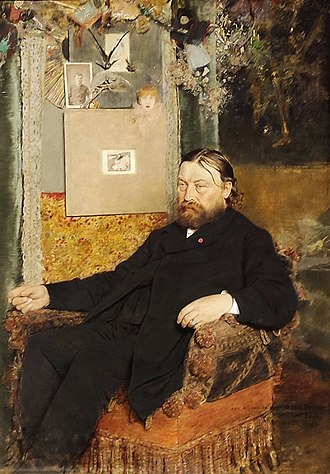Peter Benoit
Piano Concerto (1865)
I. Ballad - The Ruins Of Harelbeke Castle: Molto Moderato - 00:00
II. Song Of The Bard: Larghetto - 13:07
III. Fantastic Hunt In The Night: Molto animato - 22:37
[우리말 자료 있는 곳- blog.naver.com/kalliope63/110023225890 새들, 별모양의 정원.. ]
Peter Benoit was born at Harlebeke on 17th August 1834 and died in Antwerp on 8th March 1901. He is without doubt the most important Flemish composer of the nineteenth century 1 responsible for the foundation of a Flemish national school of music. He studied at the Brussels Conservatory 1 where his teachers included Fetis, and won the Grote Rome Prize, the highest musical distinction in Belgium. He made use of the money from the prize for a study tour through Germany and Bohemia and afterwards settled in Paris where, in 1862, he became conductor of the Bouffes-Parisiens. The following year he returned to Brussels and achieved phenomenal success with his Quadrilogie religieuse for choir and orchestra and with the oratorio of 1866, Lucifer. From then onwards he laid aside instrumental music and concentrated almost exclusively on vocal and choral music with Flemish texts. In 1867 he, settled in Antwerp, where he was appointed director of the local music school, which under his leadership became the Royal Flemish Music Conservatory .In addition to his activity as a composer, he proved himself to be a remarkable educator, conductor and music administrator.
The Symphonic Tale, Opus 43b for piano and orchestra has a detailed programme. In the opening Ballade night surrounds the crumbling castle of the Foresters at Harelbeca. The leaves of the trees rustle in the wind, the moon casts its silvery sheen on the Leie and light falls on the ruins, soaring up in majestic height, bringing glorious memories. Two themes are of basic importance in this movement, the first, announced by the French horn in C minor, introduces the tragic element that resounds as a lament throughout the ballad. The piano takes up the second theme, the chivalrous element, the fame and the pride of the old stronghold. In The Song of the Bard a deep voice is heard telling of the ancient Foresters, noble men and women, the days of Harelbeca's past greatness and the dire predictions that threaten it. In The Fantastic Hunt in the Night the sky is suddenly filled with doom-laden clouds. The mocking sound of the horns and the roll of the drums resound ominously. A hunting-party gallops by, swift as the wind. Ghostly spectres appear and the air is filled with strange rumours. The wind howls more violently and tears the crumbling castle from its foundations. The spectres swirl about the ruins, screaming in frenzy, while the clamorous sound of the bells is heard from the old tower (the tragic theme of the first movement). As dawn breaks, the noble castle of Harelbeca disappears.
In the finale of this Symphonic Tale Benoit has made use of a Flemish folk- song, A mouse came running by. This is one of the earliest examples of his use of this procedure. The solo part was later slightly reworked under the supervision of the composer by the famous pianist Arthur de Greef (1862- 1940). This revised version won considerable popularity in Flanders and was included in the repertoire of a number of virtuosi.
He also composed a Flute Concerto (Symphonic Tale), Op. 43a, and a Piano Concerto (Symphonic Tale), Op. 43b.
He died in Antwerp on 8 March 1901, aged 66.
